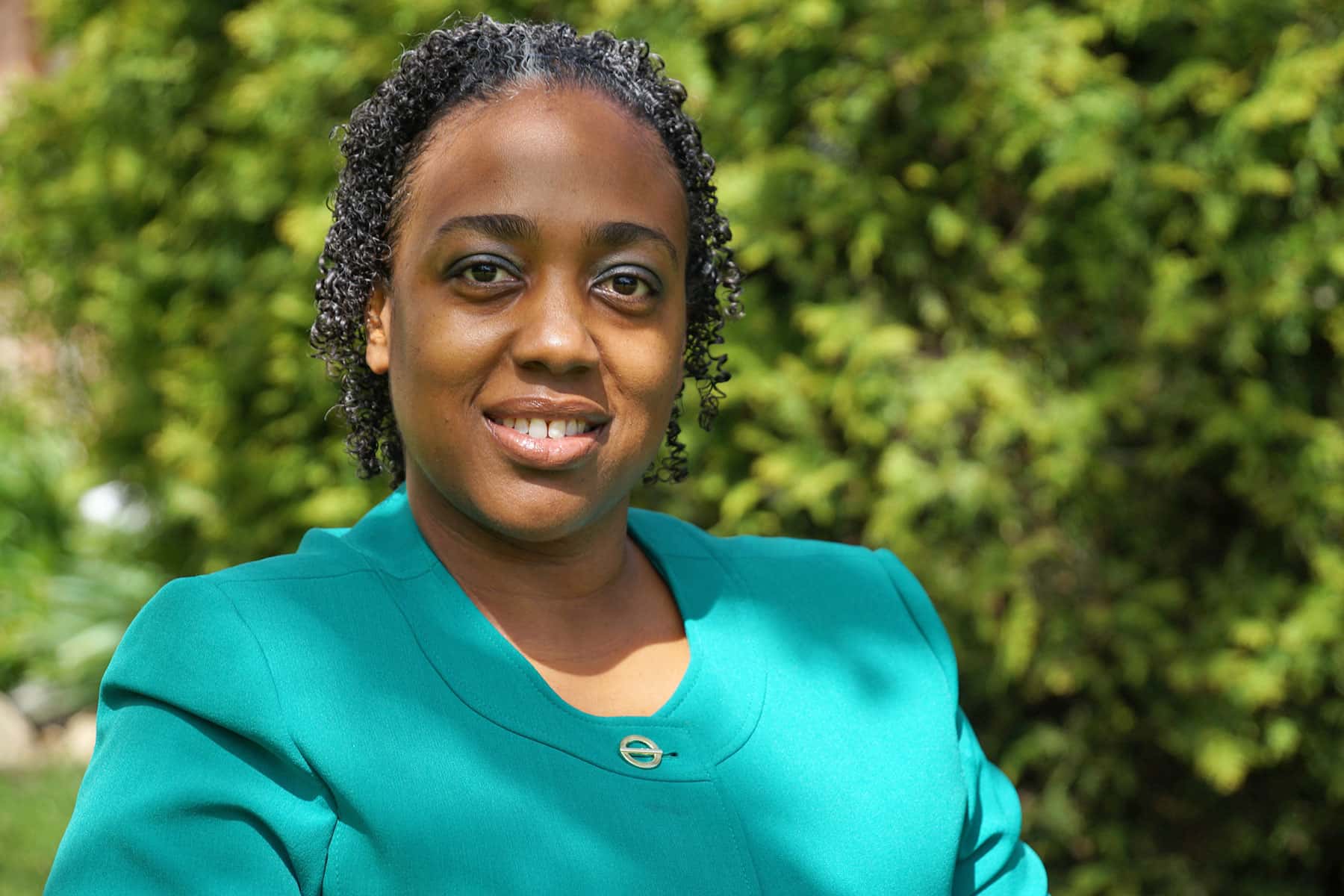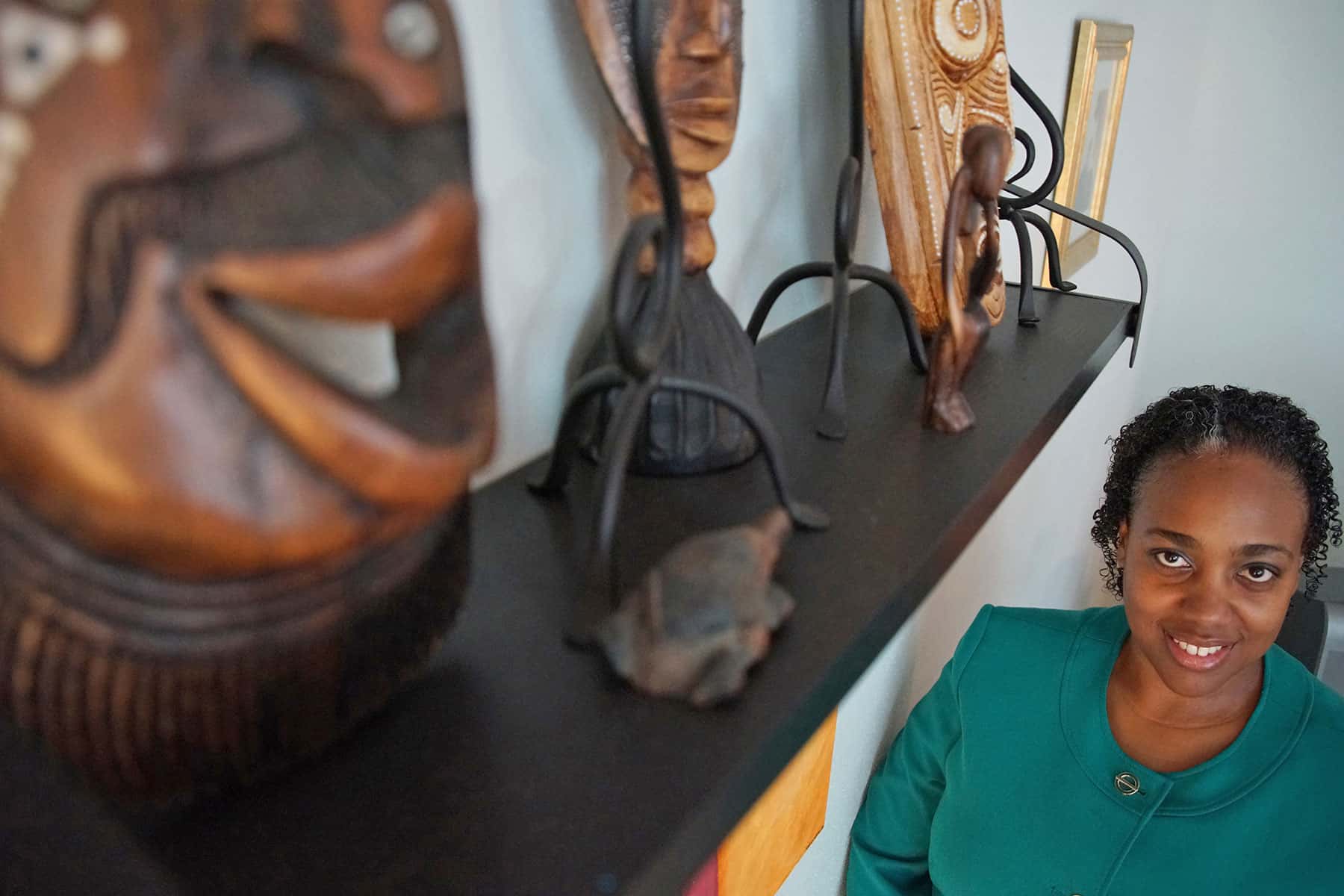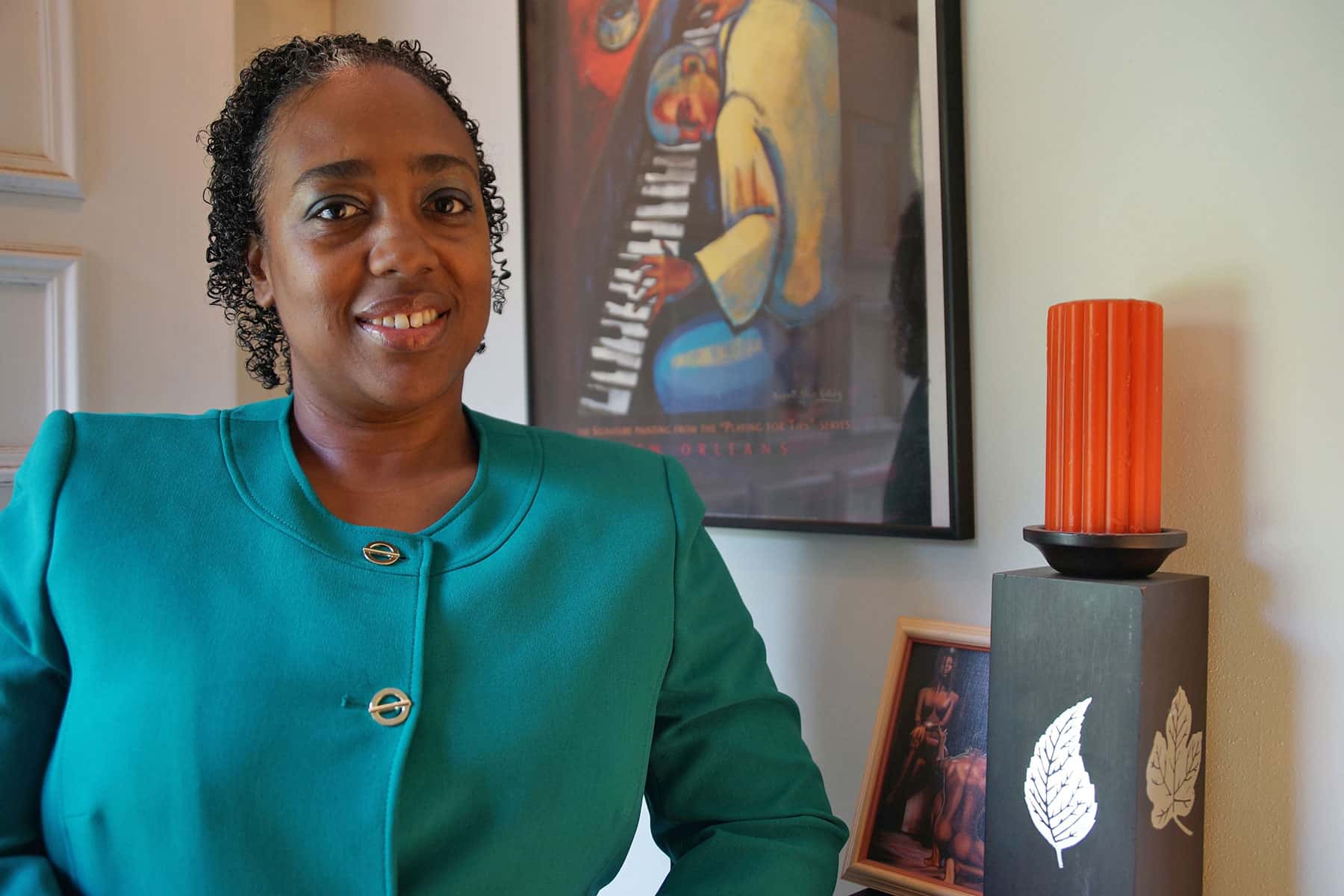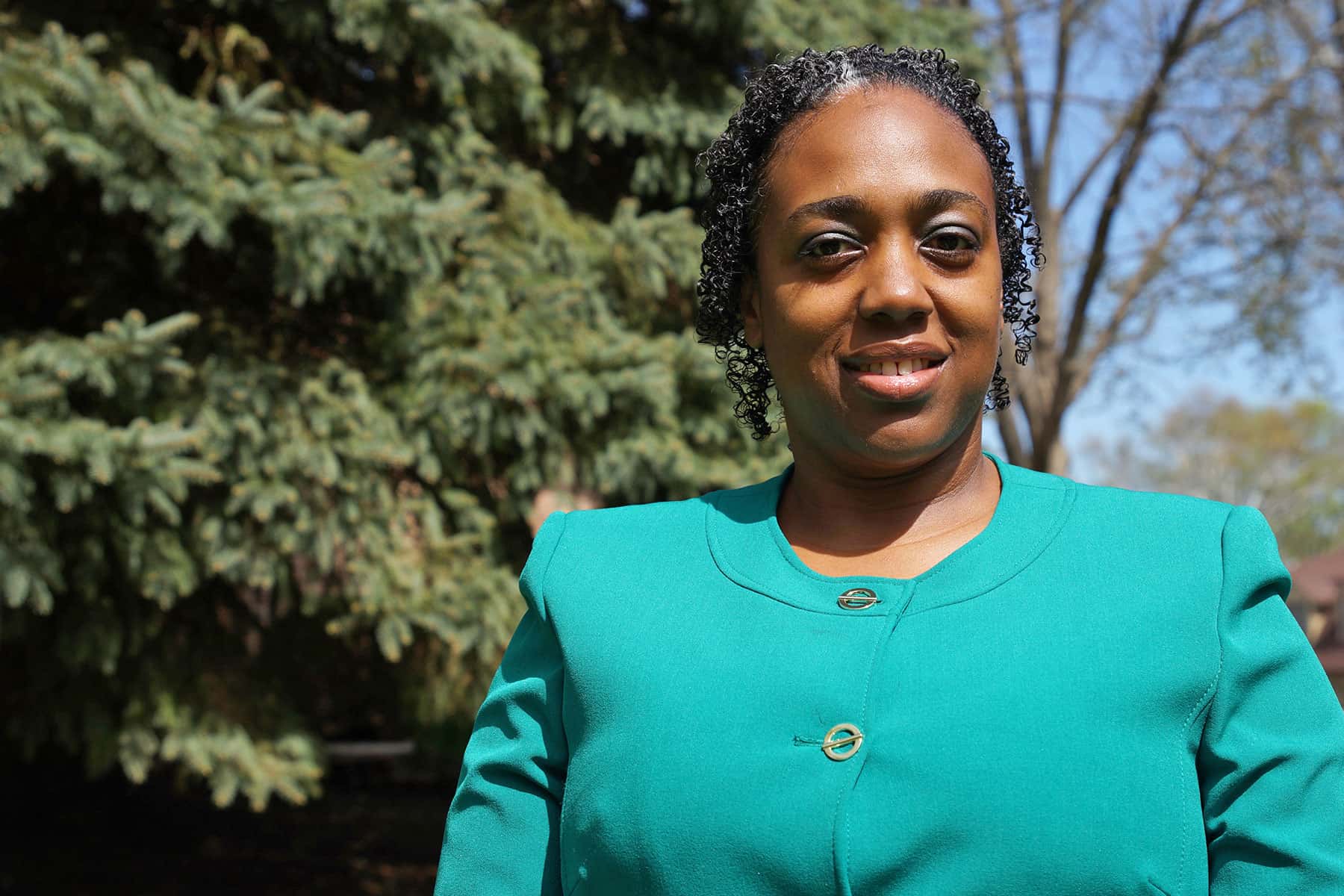
“There are sometimes when you have to stand alone and you may go against popular beliefs, because something inside of your spirit tells you that there’s something different expected for you, and you go with it.” – Denisha Tate
Paralyzed at 17 for six month, Denisha Tate refused to accept the initial diagnosis because the condition stood in the way of her helping others embrace the power of joy. Guided by a deep sense of faith, her many years in leadership roles at the Boys & Girls Clubs of Greater Milwaukee have left a positive impact on a generation of youth in search of hope and their own best self.
Q&A with Denisha Tate
Milwaukee Independent: What is the fondest memory of your youth, and who was the most influential person in your life?
Denisha Tate: The fondest memory of my youth was when my mom came home with my siblings. Each time for the 3 siblings was like a special gift that I had been waiting on. It was all for me. I made promises of being a great big sister and teaching all sorts of incredible things. I remember waiting each time to look in the eyes of my new baby. The most influential person in my life is my mom. I am wired like her. I learned what to do and not to do from her. And she is my biggest fan. She is proud of me in ways I can’t even wrap my mind around. At age 45, she still celebrates like it was my first step or my first word. She still gets thrilled. And that is love like no other.
Milwaukee Independent: How did the challenge of growing up the oldest of four children with a single parent impact your decision-making as an adult?
Denisha Tate: I learned early that life can be challenging so don’t be surprised. I also learned that giving up is not an option. I can remember being 6 years old, and promising that when I grew up I would never… interestingly enough, I remember the actual moments of the promise more than I remember the promise itself. We were being made to move again, and I promised to not do that when I grew up. The adults were having a very violent fight, I promised to not fight when I grew up. My step-father was rude and harsh, I promised to not let anyone treat me that way when I grew up. So as an adult, I have no problem opting out of relationships, making change happen, or respectfully disagreeing without ever raising my voice. I am keeping my promises to her. I needed to protect my siblings, my mom, and her. I believe that protective factor is a foundational characteristic of me as a person. I can handle a lot, but I won’t let those I care about endure too much. I feel like I have to protect them from the trauma.
Milwaukee Independent: How do people react when they learn you were paralyzed and never expected to walk again at 17, and what is the most common question they ask about that experience?
Denisha Tate: People are often surprised to learn that I was paralyzed at age 17 and told I would never walk again. Once the look of shock leaves their face, they are often apologetic and lean in to learn more, respectfully. I tell them, ‘go ahead, ask your questions.’ I can handle it. People want to know how I felt mentally and emotionally. I smile and let them know that the doctors who determined my condition were wrong. I knew they were totally wrong. I was going to be fine and I believed that. People seem relieved to know that I didn’t suffer emotionally from such devastating news. I begin to share that I had already been accepted to college and had plans for my life. So being paralyzed wasn’t an option because it did not fit into those plans. After asking how I felt, people ask if can it happen again. I smile and tell them no. God allowed me to learn what I needed from the experience so there is no need to hit the repeat button. I have so many new adventures to conquer.
Milwaukee Independent: How is faith a part of your life and the work you do?
Denisha Tate: Faith is my life and my life’s work. My mantra is LIVE LOVE. This is my wiring and my purpose for being. God allowed me to survive so that I would go beyond existing and actually LIVE and experience all that He has in store for me. My spiritual walk teaches me about that road map of life, so that I don’t dream too small and limit God. But also, that I have the faith to expect the impossible and celebrate in advance with expectancy. Love is about faith. True love occurs first, is an action not reaction. First you love, with the faith that everything will be the way you want in the end. Therefore, I live my life loving first and the rest just falls into place. I seek out opportunities to LIVE LOVE, witness others LIVE LOVE, and create the opportunity for someone else to LIVE LOVE. My life’s work is to serve people in a way that allows them to be their best selves, to be the people God called them to be, to shed light on their purpose. And in doing so, I help them LIVE LOVE as well. As a kid, I shed joy to everyone I met. My mom told me that at age 2, we would ride the bus in the morning and I would ‘hold court’ with the other riders. I would tell them all about the pending adventure of my day and would ask them about theirs. She said, I made the morning commute a giant love fest. She said when I wasn’t with her, the patrons would ask where I was and how long I would be gone. Nothing has really changed since then. I’m often told that people like talking to me because I shower them with love and they feel unstoppable when they are done.
Milwaukee Independent: How have friends, like La’Ketta Caldwell in particular, helped guide and support your personal and professional missions?
Denisha Tate: Friends like La’Ketta Caldwell have played significant roles in helping to guide and support my personal and professional missions. They have made me better, more open. I have always been comfortable giving to others. But truth be told, I was not comfortable being on the receiving end. It was not my norm so I didn’t expect it. But then you meet a person like La’Ketta, she is not only a giver like me but she insists on showering you with compliments, gifts, mushy moments, and all those things that make a person totally uncomfortable. But you realize that it is coming from such a genuine place, you can’t reject it. And even if you tried, she wouldn’t stop. I tried. But what she does is make you realize that you can be vulnerable and still be strong, a leader, confident, and safe. She was the first ‘stranger’ that showed me how to love without fear, how to let someone in just because. She is more than a friend, she is my sister. Now I can truly LIVE LOVE in a community of love, in concert with others, not alone. I believe it makes me a better leader, it makes me more approachable and human, it even softens me a bit.
Milwaukee Independent: What is it like to be a young African American woman in Milwaukee today, and have social conditions improved enough in recent years?
Denisha Tate: To be a young African American woman in Milwaukee today is difficult. As a transplant, I often feel out of place and confused about the current mental culture of the city. Why do we think the way we do, and do we want things to be this way? I do not think the social conditions have improved enough in recent years. My history is only 8 short years, but I am saddened by what I see. I have seen new leaders emerge, but hopelessness, helplessness, silos, and turf wars remain. It’s as if the old ways have been imprinted on the DNA of the city. The lack of unified movements allows Milwaukee to remain on a Ferris wheel that makes everyone feel like we are going somewhere, but once you are no longer dizzy you realize you haven’t really gone anywhere. Brilliant initiatives emerge and the same cast of players come to the table, yet change is not happening. I asked myself why? What are we not doing? I believe that Milwaukee is a city of very analytical people that are brilliant at recalling the history and discussing the details. Yet the city has not matured to be a city of doers. Don’t get me wrong, there are movers and shakers in the city, but they feel isolated and alone. They become exhausted fighting the status quo and repeatedly explaining that their desire for something different is not meant to be disrespectful to anyone that had a hand in creating the history that we recall. It’s simply time to allow a new normal to emerge.
Milwaukee Independent: Do you face personal discrimination in Milwaukee, and if so what is the most common form of it?
Denisha Tate: I do not believe I have faced personal discrimination in Milwaukee. However, I have been appalled by the ignorance that is accepted as normal behavior against people of color. The reason I don’t consider it an act of personal discrimination is because there is no intent to harm or be malicious towards me. But I have sat in meetings and listened to people make generalities about ‘Those People’ and then they look at me and say, ‘Denisha, you are different.’ Wow, am I? So did you just say I wasn’t quite black enough? Did I somehow dodge the bullet of ‘Those People’ who happen to look like me? How is it okay to think that way, to articulate those thoughts, to make decisions on behalf of a race of people based upon your ignorance of them? People only know what they know, and Milwaukee allows you to remain disconnected, unaware, and truly ignorant of those with differences and that should not be acceptable.
Milwaukee Independent: What are you most proud of accomplishing over the many years and your various roles at the Boys & Girls Clubs?
Denisha Tate: I am most proud of the successful lives of my babies. Over the past 20 years, I have been able to train staff, develop careers, mold youth, mentor teens, and guide entire organizations to break new ground. I am fortunate because people who I have influenced actually reach out and let me know. They contact me and tell me about their lives and thank me. But most of all, they let me know they made it. I have always been drawn to those who experience let downs and moments of hopelessness. I pour hope into them and remind them of, or maybe even introduce them to, the person God created them to be. Current trials are meant to teach lessons and build the muscle of resiliency. Situations are opportunities to enhance creativity and problem solving skills. Mistakes come and allow you to know how to rebound, recover, and rethink strategy. I pride myself in being that cheerleader and voice of hope to say, ‘okay, now what?’ I am proud that people have walked into their now what and they love it. They actually feel good about who they have become. It brings tears to my eyes thinking about it. I could not remove everyone from the negative situations they encounter, but I can give them the tools to use that as a training ground for their next amazing opportunity.
Milwaukee Independent: The Milwaukee mentality for leadership is based on the city’s industrial legacy, so is there hope for a new generation of leaders to adapt for the future?
Denisha Tate: I’m not sure about the current basis of Milwaukee’s mentality for leadership, however, I know that if Milwaukee wants to compete with other cities for talent, it must embrace innovation and synergy. The innovative leader is hungry for something new and impactful. They want to be an agent of change and progress. This is not done in spite of the past. It is done, learning from the past but also not held back because of it either. Also, true progress is a mentality of ‘we’ not ‘me.’ The silo mentality does not allow true progress to occur. The lack of synergy and support of innovation, on a broad scale, causes brilliance to overlook Milwaukee as a place to call home. That’s not just for transplants, it’s the issue with Milwaukee’s own. They leave and take their brilliance with them. Tenure and loyalty seem to trump impact and results. That’s a model that has not kept up with the modern times of the world around us.
Milwaukee Independent: Why do you stay in Milwaukee and not move to another city that embraces diversity? Why is being a part of the Milwaukee community and supporting it so important to you?
Denisha Tate: I stay in Milwaukee because I have been assigned to Milwaukee. I’ve thought about moving many times. But I was convicted in my spirit and felt that I was running away from an incomplete assignment. My initial work was to support the development of the next generation, our youth. Teach them to think big, aim high, and work hard to make things happen, whatever they want to see. My thoughts have now evolved to realize that I am here to help the systems that impact the next generation. How can I help systems be efficient, effective, and have positive impact in such a way that our future is on the right track? The track that doesn’t care if I’m an African American woman. The track that asks what do I have to contribute and where do I want to plug in that time, talent, and treasure to help everyone have the ‘better’ they deserve. I’m very excited about the concept of community improvement from a neighborhood focused effort. I’m interested to see the impact this will have.
Milwaukee Independent: What advice would you offer youth, who face a drug abuse environment, about finding a path to safety?
Denisha Tate: I would share this: You Chose Your Path. There are two outcomes for a young person experiencing adult drug abuse in their family. You can follow the same path or chart your own course. In order to chart your own course there are key decisions that must be made: A) Understand why people use, so that you can make a different selection. People begin drug use for many reasons like boredom, pain, anger. When one experiences those emotions, especially as a reaction to trauma, choosing something other than drugs must occur. B) Know that drug abuse is a disease. The same way we avoid those with the flu, be aware of the potential of contracting the disease. Do not engage, not even once. C) If you have begun down the path of drug use, get help now. At the moment you realize you don’t want this, get support in stopping. No one can make you stop, you must want to. D) Finally, love your family even if you hate their behavior. Carrying the pain associated with being the loved one of a drug abuser is a heavy burden. Forgive them and love them despite the disease. It will lessen the load you carry. Choose your path.
Milwaukee Independent: Why do you think people of privilege can ignore issues of poverty, and the causes that lead to and reinforce the condition?
Denisha Tate: I am not comfortable with such a generality. I believe that poverty and its causes are ignored my many people, regardless of their current economic state. Yes, our capitalistic culture definitely has disparity and classes have gaps between them that are truly inhumane and unacceptable. But we all can do more to address poverty. Teaching a person to live a life that opens doors of opportunity, and avoids pitfalls that lock you outside, is one way. How many of us are grabbing someone before they get into trouble? How many of us are silently watching loved ones make decisions that will undoubtedly cause the financial struggle to increase? We celebrate the addition to family that can’t be afforded, like a new car, bigger house, motorcycle, more clothes. These decisions push the debt higher and cause the stress to increase, yet we say nothing. Aren’t we just as guilty on a micro level? I’m not pardoning the systems of oppression and disenfranchisement. I simply believe there is more we all must do if we want to level the playing field for families in our community.
Milwaukee Independent: With all the abundance of our modern city, is there a reason why so much attention is focused on scarcity?
Denisha Tate: The reason is because lack is real. Lack is the problem that causes everyone concern, because what if it somehow becomes part of their story. It’s like bad news. Bad news travels fast because people are drawn by emotion to know what happened and why. We focus our attention on scarcity, rightfully so, but it should not be the only story. Milwaukee has such richness in culture, cuisine, environmental beauty, and amazing people, yet we repeatedly talk about our crime, low educational attainment, blight, and infighting. We must want the narrative to be different. I’m not sure that we want something new to be our point of attention. There may be a fear that if we don’t give scarcity attention, we will stop trying to do something about it, and that would be crіmіnаl indeed.
Milwaukee Independent: In your opinion, why is progress in Milwaukee measured by engineering new buildings, with less effort given to re-engineering how people live and try to make the community better?
Denisha Tate: I believe progress is being made to re-engineer how people live, and try to make the community better. The problem is, a new building is easier. You can see an empty plot of land and notice the gap it creates in the facade of a neighborhood. When a new building is built, it’s presence is visible, constant, and disruptive to the previous view. That excites everyone and makes them feel that ‘progress’ has occurred. People, however, are not that simple. Change takes time, commitment, will, engagement, and the ability to see the difference. The untrained eye may miss it. I believe significant effort is being made, but unlike the new buildings that adorn our city, I’m not confident that the effort has resulted in change that can be seen by the naked eye. Effort is present but sustainable impact has yet to be seen on a mass scale.
Milwaukee Independent: What is your hope for the future of Milwaukee, and the conditions for those living in the most disadvantaged communities?
Denisha Tate: My hope is for a unified desire and insistence on something better. I want us all to want better. I want us all to be willing to make ‘better’ happen. I want us all to understand how to contribute to making better happen and do it now, not someday.
Milwaukee Independent: In your experience, does local media coverage contribute the role of racial misunderstanding in Milwaukee and reinforce the city’s segregation?
Denisha Tate: In my experience, local media has provide various lens to racial misunderstanding in Milwaukee. I believe that media has power, and the power must be guarded. When we force media to be sexy, entertaining, and compete with the reality shows for our attention, we unleash the power that can slant reality in any direction it chooses. I’m not certain who is driving the bus, however. It is the media who wants to sensationalize news or is it the consumer who will not pay attention if the sensationalized experience is missing? Maybe a little of both. And yes, racial tension sells.
“The lack of unified movements allows Milwaukee to remain on a Ferris wheel that makes everyone feel like we are going somewhere, but once you are no longer dizzy you realize that you haven’t really gone anywhere.” – Denisha Tate

















